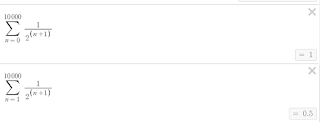reaasures me that my working formula is indeed the correct
one for the whole complex plane. And I am starting to see how
each computational chunk of it would need a lot of work to see
what is going on.
Looking at the uses of s at either end, they behave in opposition
for both s greater than 1 - the Euler zeta for reals - and for s between
0 and 1, thus fractions and possibly complex expressions. This reflects
Riemanns multiplication of the old zeta with the gamma functions
to form his new zeta. (Is this a troll from the 19th century!?)
* * *
Not really complicated numerically, the first term is worth 2
for s at 2, and -5/2 for s at .5. It is a constant which can be
considered at each turn of fraction summation conceptually, but
stated outside as a mathematical simplification.
The last term referencing s - as a funtion of k - is not a constant,
and will have a different effect with the different number of
iterations we ask for.
It is the work of the first term that shows the zeta is undefined
at 1.
* * *
Of more immediate concern, my transcription of the formula on
the (very useful) Desmos. It is clear that the fractions summation -
if we are careful about the zero value - goes to 1. And one is
tempted to dismiss the expression. THAT WOULD BE A SERIOUS
MISTAKE! In point of fact, it is never 1. And since we are looking
for zero coincidences...
The (-1) oscillation produces some zero factors, in its sums.
The binomial expression plays out entirely as a function the
n value we assign.
🙀









No comments:
Post a Comment